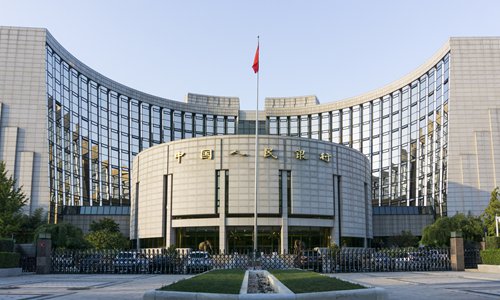
Headquarters of the People's Bank of China, China's central bank, in Beijing in October 2018 Photo: IC
China's push to transform the yuan into a global currency is set to gain momentum alongside efforts to continue opening up its financial markets, analysts said, noting that the nation's effective containment of the coronavirus outbreak is helping to stabilize the Chinese currency.
The yuan's globalization indicates the international use of the currency as well as purchases of yuan-denominated assets. Yuan-denominated assets seem increasingly attractive, judging by some metrics, Lu Zhengwei, chief economist at Industrial Bank in Shanghai, told the Global Times on Wednesday.
"The global yuan push was previously underpinned by trade settlements and the extension of yuan-denominated loans to help build infrastructure projects in other countries, but [it turns out that] opportunities for the yuan's globalization lie in capital account opening this year," Lu said, saying that overseas investors would increase their holdings in Chinese mainland shares and bonds.
The nation scrapped foreign shareholding limits in securities firms effective April 1, the latest sign of ongoing financial deregulation.
Wu Jinduo, head of fixed income at the research institute of Great Wall Securities, is bullish about the ascension of the yuan, which has already been included in the IMF's Special Drawing Rights basket. Wu said that China's central bank has long pushed to expand the currency's role in commodity trade and currency swaps with other nations.
Trade in epidemic-fighting items would have a limited impact on the yuan's global push, however, Wu told the Global Times on Wednesday, because such trade can neither become the norm nor be standardized.
Swings between net outflows from and net inflows into the mainland stock market via trading links with Hong Kong since late February point mostly to coronavirus-induced global market fragility, observers said, maintaining an optimistic outlook for the investment-worthiness of mainland equities.
The volatility doesn't reflect concerns over the security of Chinese assets. Instead, it signals a risk-off investment stance and the fragility of global capital markets amid the pandemic, Wu said.
Chinese bond yields are still higher than those available in developed economies, especially compared with Japan — which has negative yields — and the US, where yields are close to zero, Wu said. The yield spread makes Chinese bonds attractive to overseas buyers.
In recent years, overseas capital has both entered and left the mainland market during periods of global volatility. But net overseas capital inflows stood at about 300 billion yuan ($42.46 billion) annually on average during the past three years.
The virus outbreak is coming under control domestically and work is being resumed in an orderly manner. Further, A shares have much lower valuations compared with US stocks, so net overseas capital inflows are likely to near 300 billion yuan this year, according to Haitong Securities.
The mainland stock market saw a net inflow of more than 5 billion yuan on Wednesday, down from more than 16 billion yuan on Tuesday.
The accelerated pace of work and production resumption since March and the domestic containment of the disease are favorable for a stable yuan, Wu said.
China's foreign exchange reserves held above $3 trillion in March. The yuan is also being supported by last month's merchandise trade surplus and a substantial pick-up in manufacturing activity during the month.
Recent declines in the US Dollar Index are easing depreciation pressure on the yuan, Wu said.
A worldwide lockdown that's setting the stage for the worst global economic slump since the Great Depression suggests tremendous downward pressure on the Chinese economy, the Great Wall Securities analyst said, noting that the yuan has hovered around 7 against the US dollar since the start of the year, and it's unlikely that the yuan would trend stronger.
The yuan's daily fixing rate was set at 7.0402 on Wednesday, slightly stronger than 7.0406 on the prior day, official data showed.




